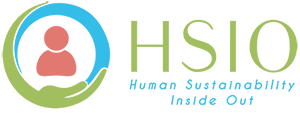“32% of teen girls said that when they felt bad about their bodies, Instagram made them feel worse.”
“Teens blame Instagram for increases in the rate of anxiety and depression.”
“Among teens who reported suicidal thoughts, 13% of British users traced the desire to kill themselves to Instagram.”
Our Purpose
“You cannot enslave a mind that knows itself, that values itself, that understands itself” – Wangari Maathai
70 million individuals struggling with eating disorders worldwide. One in four will attempt suicide. Eating disorders have the highest mortality rate of any mental disorder.
The number of adults, teens and children seeking help and hospitalized for eating disorders has dramatically increased during the COVID-19 pandemic. with number of urgent and routine referrals doubling in countries such as the U.K. The omnipresence of social media in our daily lives is just accentuating this subjacent pandemic.
Eating disorders are not limited to body-conscious teenage girls, but can affect each of us regardless of age, gender, ethnicity or socioeconomic status. Personally touched by this issue, we are in the duty to support all those who, directly or indirectly, are struggling with our most basic human need: eating.
Eating disorders are just the top of a complex iceberg. Healing requires taking an holistic view of the problem, taking into account all the atoms that made up this immense iceberg. It requires understanding where we are coming from – all the events and characters who shaped nowadays’ culture of perfection, as well as the forces which influence our brains and bodies – from our internal neurobiological processes to the external powerful social media algorithms that manipulate our vulnerabilities.
How does this work? We hope to provide you the tools and resources to better understand the past and current forces that may be today creating this destructive tornado within you. Please feel free to contact us through our LinkedIn page if there is any other way we can support you and your beloved.
Behind the Headlines: "All that glitters is not gold"
“I Instagram therefore I am”. Bodies, Minds and Social Media.
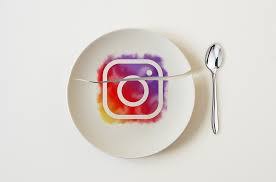
Facebook Knows Instagram Is Toxic for Teen Girls, Company Documents Show
Researchers inside Instagram, which is owned by Facebook, have been studying for years how its photo-sharing app affects millions of young users. Repeatedly, the company found that Instagram is harmful for a sizable percentage of them, most notably teenage girls, more so than other social-media platforms. In public, Facebook has consistently played down the app’s negative effects, including in comments to Congress, and hasn’t made its research public or available to academics or lawmakers who have asked for it.
By Georgia Wells, Jeff Horwitz and Deepa Seetharaman
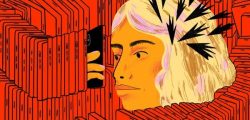
Eating Disorders and Social Media Prove Difficult to Untangle
Social media platforms like TikTok and Instagram try to monitor for content related to the problem, but it is not always clear what to do about it.
By Kate Conger, Kellen Browning and Erin Woo

How TikTok's Algorithm Figures You Out
A Wall Street Journal investigation found that TikTok only needs one important piece of information to figure out what you want: the amount of time you linger over a piece of content. Every second you hesitate or rewatch, the app is tracking you.
By Wall Street Journal
Behind Work Desko Dining: "We never work hard enough, achieve enough, or diet enough"
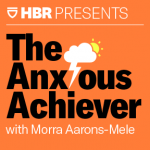
How We Cope: Food and Eating Disorders at Work
Work is a part of our daily lives — as is food. Disordered eating and diagnosed eating disorders can be tricky to deal with at the office, but they can be common in high achievers and are closely tied to anxiety and mental health.
Morra Aarons-Mele speaks with Melissa Gerson, director and founder of the Columbus Park treatment center for eating disorders, about the relationship between anxiety and eating, and how it can play out at work.
By Morra Aarons-Mele and Melissa Gerson, HBR Presents
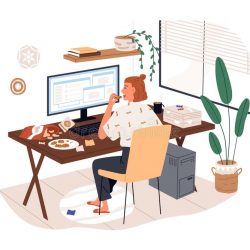
When Work Triggers Eating Disorders
Lots of people think that that the main culprits are self-esteem issues due to unrealistic portrayals of body image in the media, or perhaps family and relationship problems that lead sufferers to try to gain a little more control over their lives by controlling their eating behaviors. While those things are major causes of anorexia, binge eating disorder and bulimia, there is another major culprit which is often overlooked – work.
Whether you’re under pressure to hit sales targets, be nice to even the most difficult customers or to meet impending deadlines, work is a challenging place to be, so it’s no wonder that surprising that stress in the workplace is a serious contributing factor to eating disorder.
By The Meadowglade, a rehabilitation facility specializing in mental health and eating disorders.

I’ve had an eating disorder my entire working life
Between 1.25 million-3.4 million people in the UK have an eating disorder, and most of them are adults. But we don’t talk about them at work. Unlike more common mental health problems, like stress and anxiety, eating disorders still remain firmly in the shadows.
Part of this is due to the misconception that one must be severely underweight to experience an eating disorder, or that they only affect teenage girls. In fact, eating disorders affect people of all ages, genders and body sizes, and are rising rapidly among men, people from racialised backgrounds and members of the LGBTQ+ community. In this blog, Rachel Egan, a Senior Marketing Officer for Mind, shares her experiences of working with an eating disorder.
By Rachel Egan
Senior Marketing Officer at Mind
Behind the Myths: "Know the Past to understand the Present"

Helena Rubinstein: Making up the Modern Woman
Harvard Business School professor Geoff Jones discusses his case entitled “Helena Rubinstein, Making Up the Modern Woman,” which examines the career of Helena Rubinstein, one of the trailblazing female entrepreneurs of the 20th century. Using guile, brilliant branding, and more than a few falsehoods, Rubinstein lifted cosmetics from an accessory item for prostitutes to a great luxury item during the Great Depression.
By Geoffrey Jones, Cold Call, Harvard Business School
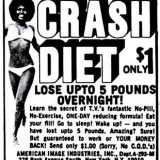
The history of the 'ideal' woman and where that has left us
We as a culture, as a society, are obsessed with size. It's become connected to our identity as people. Whether it's contemporary or 19th century, we want to know what size it is or what size it would correlate to, or what measurement it is. This article explores how this "ideal" is ever-changing, forming a complex history throughout art and fashion -- with damaging impacts on women who try to conform in each era.
By Jacqueline Howard, CNN

Geoffrey Jones, Author of Beauty Imagined (Part 1)
In his new book Beauty Imagined, Professor Geoffrey Jones provides the first authoritative history of the global beauty industry, from its emergence in the 19th century to the present day. His book shows how successive generations of entrepreneurs created companies and built brands that shaped perceptions of beauty. These firms not only democratized access to beauty products, once the privilege of elites, but also defined the gender and ethnic perceptions of beauty, and its association with a handful of cities, notably Paris and later New York.
By Geoffrey Jones, Author of Beauty Imagined
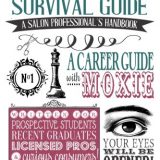
Geoffrey Jones, Author of Beauty Imagined (Part 2)
he global beauty business permeates our lives, influencing how we perceive ourselves and what it is to be beautiful. The brands and firms which have shaped this industry, such as Estée Lauder, Chanel, L'Oréal, and Shiseido, have imagined beauty for us. Today globalization is changing the beauty industry again. The book shows how global brands swept into China, Brazil and Russia, but at the same time, these brands had to respond to a far greater diversity of cultures and lifestyles as new markets are opened up worldwide. In the twenty first century, beauty is again being re-imagined anew.
By Geoffrey Jones, Author of Beauty Imagined
Behind Our Brains: "There is not such a freedom as being the microsurgeon of your Mind"
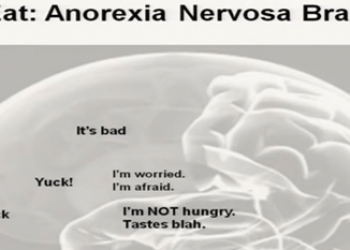
Understanding the Brain May Help Explain Eating Disorders
Research published at the Scientific American MIND argues that to overcome eating disorders, we must look more closely at the brain’s role in these conditions, specifically how its misfiring may lead to inappropriate responses to food. Physician Laura Hill of The Center for Balanced Living in Columbus, Ohio, is among these advocates, and in this TEDx video she walks through how a person with anorexia responds to food differently on a biological level.
By Daisy Yuhas, Scientific American
